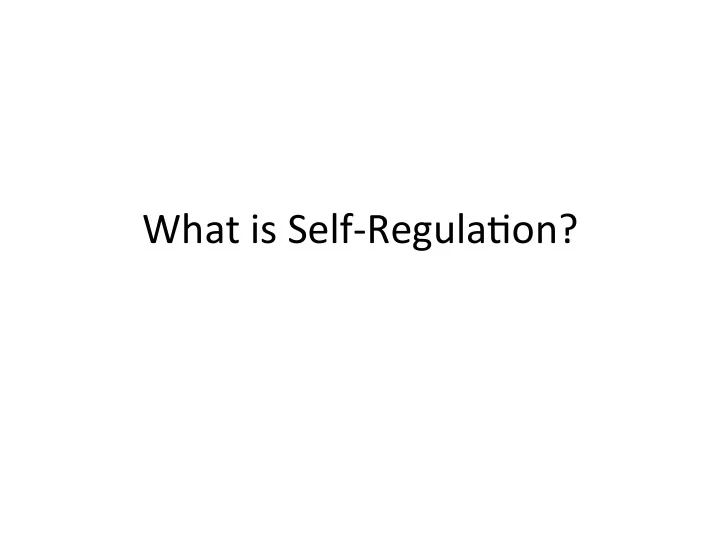

What ¡is ¡Self-‑Regula0on? ¡
¡ Self-‑regula0on ¡is ¡the ¡ability ¡to ¡develop, ¡ implement, ¡and ¡flexibly ¡maintain ¡planned ¡ behavior ¡in ¡order ¡to ¡achieve ¡one's ¡goals. ¡ (Kanfer, ¡1970) ¡
¡ ¡ A ¡set ¡of ¡conscious ¡and ¡unconscious ¡processes ¡ that ¡affect ¡the ¡ability ¡to ¡control ¡our ¡responses. ¡ ¡ (Bandy ¡& ¡Moore, ¡2010) ¡
¡ The ¡process ¡whereby ¡students ¡ac0vate ¡and ¡ sustain ¡cogni0on, ¡behaviour, ¡and ¡affect, ¡which ¡ are ¡systemically ¡oriented ¡toward ¡aPainment ¡of ¡ their ¡goals. ¡ (Schunk ¡& ¡Zimmermann, ¡1994) ¡
¡ The ¡ability ¡to ¡manage ¡your ¡own ¡energy ¡states, ¡ emo0ons, ¡behaviours ¡and ¡aPen0on, ¡in ¡ways ¡ that ¡are ¡socially ¡acceptable ¡and ¡help ¡achieve ¡ posi0ve ¡goals, ¡such ¡as ¡maintaining ¡good ¡ rela0onships, ¡learning ¡and ¡maintaining ¡ wellbeing. ¡ (Shanker, ¡2012) ¡
¡ One’s ¡ability ¡to ¡change ¡or ¡alter ¡behaviour ¡in ¡ accordance ¡to ¡a ¡set ¡of ¡standards, ¡ideals ¡or ¡goals ¡ stemming ¡from ¡internal ¡or ¡external ¡expecta0ons ¡ (Baumeister ¡& ¡Vohs, ¡2007) ¡
• Ability ¡to ¡control ¡thoughts ¡and ¡ac0ons ¡to ¡ achieve ¡personal ¡goals ¡and ¡respond ¡to ¡ environmental ¡demands ¡(Zimmerman, ¡2008). ¡
A ¡Mul0tude ¡of ¡Domains ¡ • Behaviour ¡ • Physiology ¡ • Cogni0on ¡ • APen0on ¡ • Emo0ons ¡ • Mo0va0on ¡
Self-‑ ¡Regulated ¡Learning ¡ • Strategic ¡engagement; ¡ ¡ • Metacogni0on; ¡ • Mo0va0on ¡to ¡learn. ¡ ¡ ¡ • Learners ¡are ¡described ¡as ¡self-‑regula0ng ¡when ¡ they ¡are ¡engaged, ¡thinking, ¡proac0ve, ¡ responsive, ¡and ¡reflec0ve. ¡ ¡ ¡(SRL ¡Consor0um ¡Canada) ¡
SRL ¡Myth ¡Busters ¡ • It’s ¡not ¡the ¡same ¡as ¡compliance ¡ • It’s ¡more ¡than ¡self-‑control ¡ • SRL ¡is ¡not ¡synonymous ¡with ¡independent ¡work ¡ Nancy ¡Perry, ¡UBC ¡
Outcomes ¡& ¡Implica0ons ¡ ¡ of ¡Self-‑Regula0on ¡ • ê in ¡unhealthy ¡& ¡risky ¡behaviours ¡ • é in ¡physical ¡and ¡mental ¡health ¡ • é academic ¡achievement ¡ • é school ¡engagement ¡ • é social ¡acceptance ¡ • Self-‑Regula0on ¡is ¡a ¡predictor ¡of ¡academic ¡and ¡ life ¡success ¡
How ¡is ¡Self-‑Regula0on ¡ connected ¡with ¡learning? ¡
Cogni&ve ¡Developmental ¡ Neuroscience ¡
Execu&ve ¡Func&ons: ¡The ¡ Science ¡of ¡Learning ¡ ¡ Working ¡Memory: ¡Holding ¡informa0on ¡in ¡mind ¡while ¡ mentally ¡working ¡with ¡it. ¡ ¡ ¡ Cogni&ve ¡Flexibility: ¡ Changing ¡perspec0ves ¡or ¡ approaches ¡to ¡a ¡problem, ¡flexibly ¡adjus0ng ¡to ¡new ¡ demands, ¡rules ¡or ¡priori0es. ¡ ¡ Inhibitory ¡Control: ¡Controlling ¡one’s ¡aPen0on, ¡ behaviour, ¡thoughts ¡and/or ¡emo0ons ¡to ¡override ¡strong ¡ internal ¡predisposi0on ¡or ¡external ¡lure. ¡ ¡ ¡
What ¡affects ¡our ¡execu&ve ¡ func&ons? ¡ • Sleep ¡ • Diet ¡ • Fitness ¡ • Over-‑ ¡and ¡under-‑s0mula0on ¡ • Heightened ¡Emo0ons ¡ • Stress ¡ • Trauma ¡ • Sense ¡of ¡Isola0on ¡ ¡
How ¡can ¡we ¡teach ¡self-‑regula0on? ¡ • Consider ¡our ¡own ¡well-‑being ¡ • Model ¡effec0ve ¡self-‑regula0on ¡ ¡ • Teach ¡strategies ¡explicitly ¡ • Teach ¡a ¡rich ¡emo0on ¡vocabulary ¡ ¡ • Use ¡literature ¡to ¡explore ¡regula0on ¡(emo0ons, ¡ thoughts, ¡physiology) ¡ • Decrease ¡s0muli ¡from ¡the ¡environment ¡ • Create ¡safe ¡places ¡for ¡students ¡to ¡work ¡quietly ¡ (or ¡calm ¡down) ¡ • Teach ¡mindfulness ¡
Recommend
More recommend